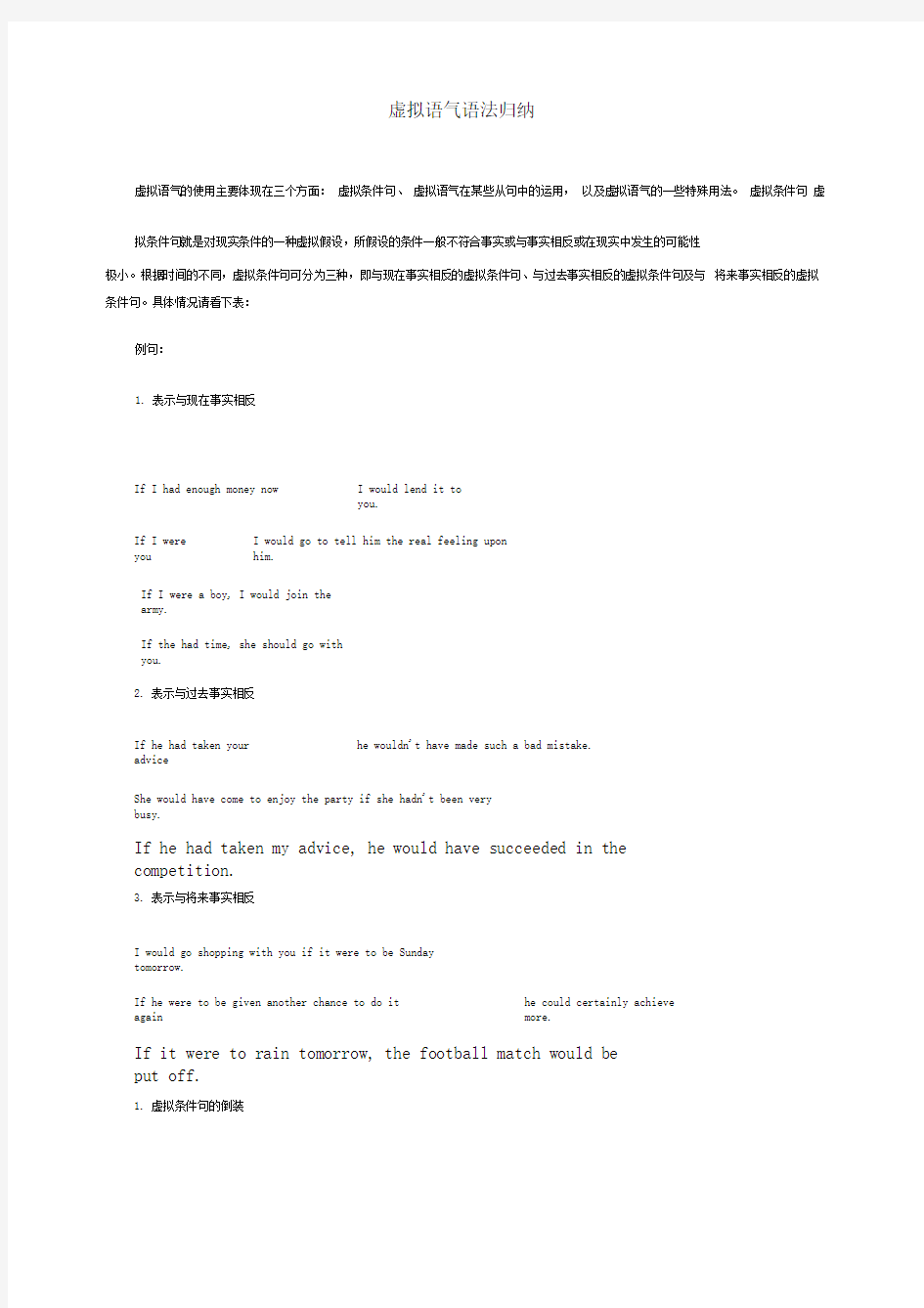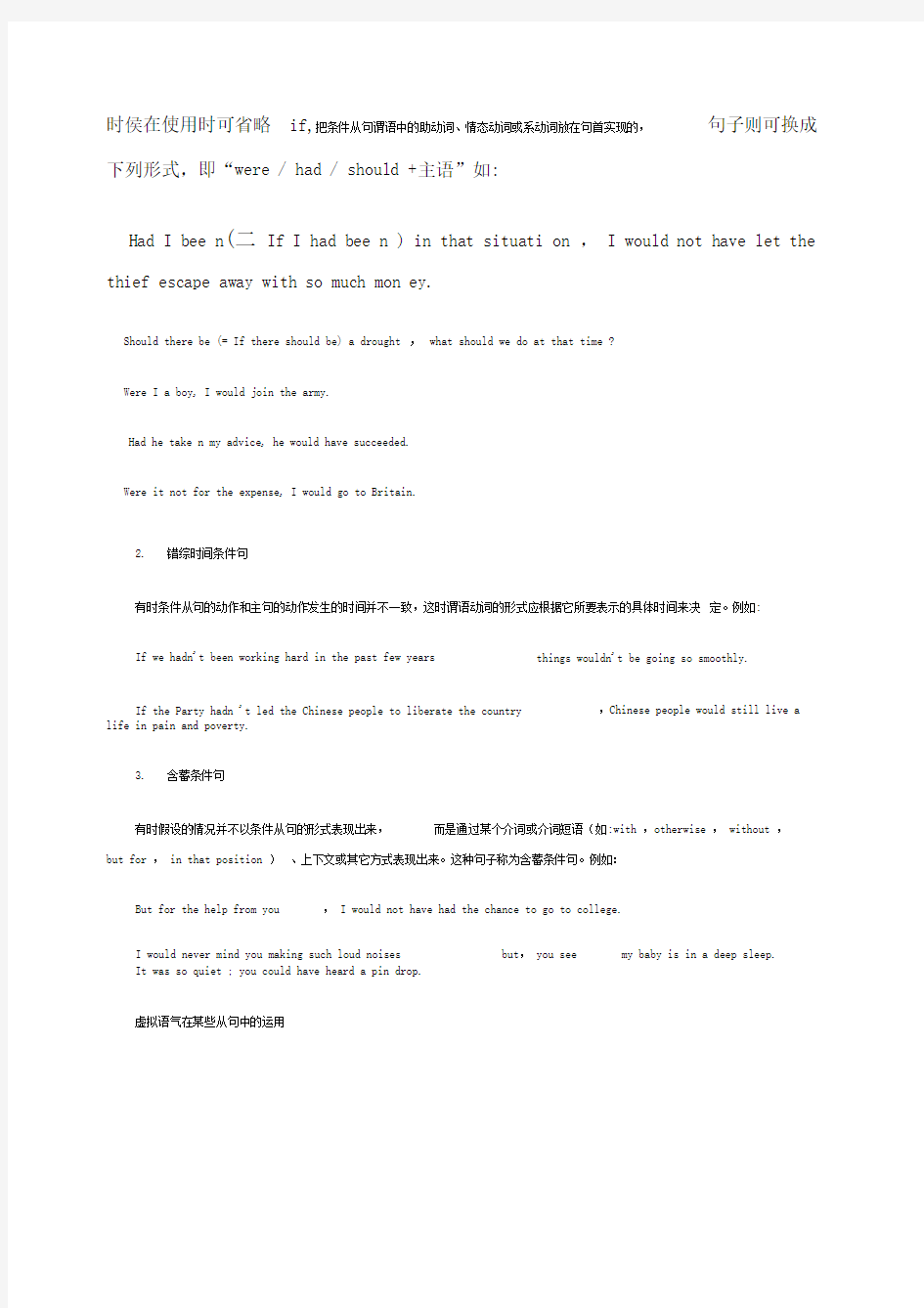虚拟语气语法归纳


虚拟语气语法归纳
虚拟语气的使用主要体现在三个方面:虚拟条件句、虚拟语气在某些从句中的运用,以及虚拟语气的一些特殊用法。虚拟条件句虚拟条件句就是对现实条件的一种虚拟假设,所假设的条件一般不符合事实或与事实相反或在现实中发生的可能性
极小。根据时间的不同,虚拟条件句可分为三种,即与现在事实相反的虚拟条件句、与过去事实相反的虚拟条件句及与将来事实相反的虚拟条件句。具体情况请看下表:
例句:
1. 表示与现在事实相反
If I had enough money now I would lend it to
you.
If I were you I would go to tell him the real feeling upon him.
If I were a boy, I would join the
army.
If the had time, she should go with
you.
2. 表示与过去事实相反
If he had taken your
advice
he wouldn't have made such a bad mistake.
She would have come to enjoy the party if she hadn't been very
busy.
If he had taken my advice, he would have succeeded in the competition.
3. 表示与将来事实相反
I would go shopping with you if it were to be Sunday
tomorrow.
If he were to be given another chance to do it again he could certainly achieve more.
If it were to rain tomorrow, the football match would be put off.
1. 虚拟条件句的倒装
时侯在使用时可省略 if,把条件从句谓语中的助动词、情态动词或系动词放在句首实现的,
句子则可换成
下列形式,即“were / had / should +主语”如: Had I bee n (二 If I had bee n ) in that situati on , I would not have let the thief escape away with so much mon ey.
Should there be (= If there should be) a drought , what should we do at that time ?
Were I a boy, I would join the army.
Had he take n my advice, he would have succeeded.
Were it not for the expense, I would go to Britain.
2. 错综时间条件句
有时条件从句的动作和主句的动作发生的时间并不一致,这时谓语动词的形式应根据它所要表示的具体时间来决 定。例如:
If we hadn't been working hard in the past few years If the Party hadn 't led the Chinese people to liberate the country
life in pain and poverty. 3. 含蓄条件句
有时假设的情况并不以条件从句的形式表现出来, 而是通过某个介词或介词短语(如:with ,otherwise , without , but for , in that position ) 、上下文或其它方式表现出来。这种句子称为含蓄条件句。例如:
But for the help from you , I would not have had the chance to go to college.
It was so quiet ; you could have heard a pin drop. 虚拟语气在某些从句中的运用
things wouldn't be going so smoothly.
,Chinese people would still live a
I would never mind you making such loud noises
but , you see my baby is in a deep sleep.
在某些词或短语后接的从句中要使用虚拟语气,表示愿望、建议或命令等。根据虚拟语气的形式不同,虚拟语气可以分为“should类"和过去时态类”。
2、虚拟语气用于名词性从句
(1)虚拟语气在宾语从句中的运用。
①“wish +宾语从句”表示不能实现的愿望,译为要是……就好了”等。表示现在不能实现的愿望,
从句中的谓语动词用一般过去时;表示将来不能实现的愿望,从句中的谓语动词用“would/could +动词
原形”;表示过去不能实现的愿望,从句中的谓语动词用“had +过去分词"或“could(should) + have + 过
去分词”。如:
I wish it were spri ng all the year round.
I wish I had known the an swer.
I wish I could fly like a bird.
②在表示建议、要求、命令等的动词suggest、advise、propose、dema nd、require、in sist request、
comma nd、order等后的宾语从句中,谓语动词用should + 动词原形或是动词原形。如:She suggested we (should)leave here at once.
The doctor ordered she should be operated.
(2)虚拟语气在同位语从句和表语从句中的运用。
作表示建议、要求、命令等的名词advise、idea、order、dema nd、pla n、proposal、suggestio n、
request等的表语从句和同位语从句,从句中的谓语动词用"(should ) +动词原形”。女口:His suggestio n that we (should)go to Shan ghai is won derful.
My idea is that they (should)pay 100 dollars.
(3)虚拟语气在主语从句中的运用。
在主语从句中,谓语动词的虚拟语气用“should +动词原形”的结构,表示惊奇、不相信、理应如此
等。如:
It is n ecessary(importa nt, n atural, stra nge, etc.)that we should clea n the room every day.
It will be desired(suggested, decided, ordered, requested, proposed, etc.)that she should finish her homework this after noon.
注意:这种从句表示的是事实。如果说人对这种事实表现出惊奇的情感,就可用虚拟语气。反之,
如果不表示惊奇等情感,that从句也可用陈述句语气。如:
It is pity that you can ' t swim.
3、虚拟语气在其他场合的运用
(1)虚拟语气在as if/as though、even if/even though 等引导的表语从句或状语从句中,如果从句表
示的动作发生在过去,用过去完成时;指现在状况,则用一般过去时;指将来状况则用过去将来时。如: He did it as if he were an expert.
Even if she were here, she could not solve the problem.
(2)虚拟语气用于定语从句中。
这种从句常用于句型“It is (high)time (that) 中,??定语从句的谓语动词用一般过去时(be用were)或should +动词原形,意思是现在)该……”。女口:
It ' s time that I picked up my daughter.
It ' s high time we were going.
(3)虚拟语气用在if only引导的感叹句中。如:
If on ly I were a bird.
If only I had take n his advice.
(4)虚拟语气在一些简单句中的运用。
①情态动词的过去式用于现在时态时,表示说话人谦虚、客气、有礼貌或语气委婉,常出现在日常会话
中。如:
It would be better for you not to stay up too late.
Would you be kind eno ugh to close the door?
②用于一些习惯表达法中。如:
Would you like a cup of tea?
I would rather not tell you.
一、should 类
这一类的虚拟语气是通过从句中的谓语动词使用“should +动词原形”体现出来的,should可以省略。其具体运用
体现在:
1.在 suggest , order , demand , propose , command , request , desire , insist 等表示建议、命令、要求、意见的动词后接的宾语从句中要使用虚拟语气。
如:
He suggests that she should leave the house at once.
The leader ordered that the task(should) be finished as soon as possible.
He proposed that we (should) deal with the problem by the view of development.
2.与 suggest , order , demand , propose , command , request , desire , insist 等动词相对应的
名词suggestion , order , demand , proposal 等后的表语从句或同位语从句中要使用虚拟语气。如:The general sent the order that the battle(should) be held on untilthe complete failure of the enemy.
My proposal is that we(should) set a deadline for handing in the plan.
3.在 It is/was suggested (ordered , demanded , proposed , etc.) 结构以及 necessary , essential
important , strange , natural等形容词后的主语从句中要使用虚拟语气。如:
It's requested that we (should) keep the stability of the society for the people's peaceful life.
It is necessary that the badly wounded man(should) be treated immediately.
二、过去时态类
英语中,还有一些词或短语后接的从句或句子,也要使用虚拟语气,虚拟语气是通过句中的谓语使用过去的某种时态(如:一般过去时、过去完成时等)来体现的
